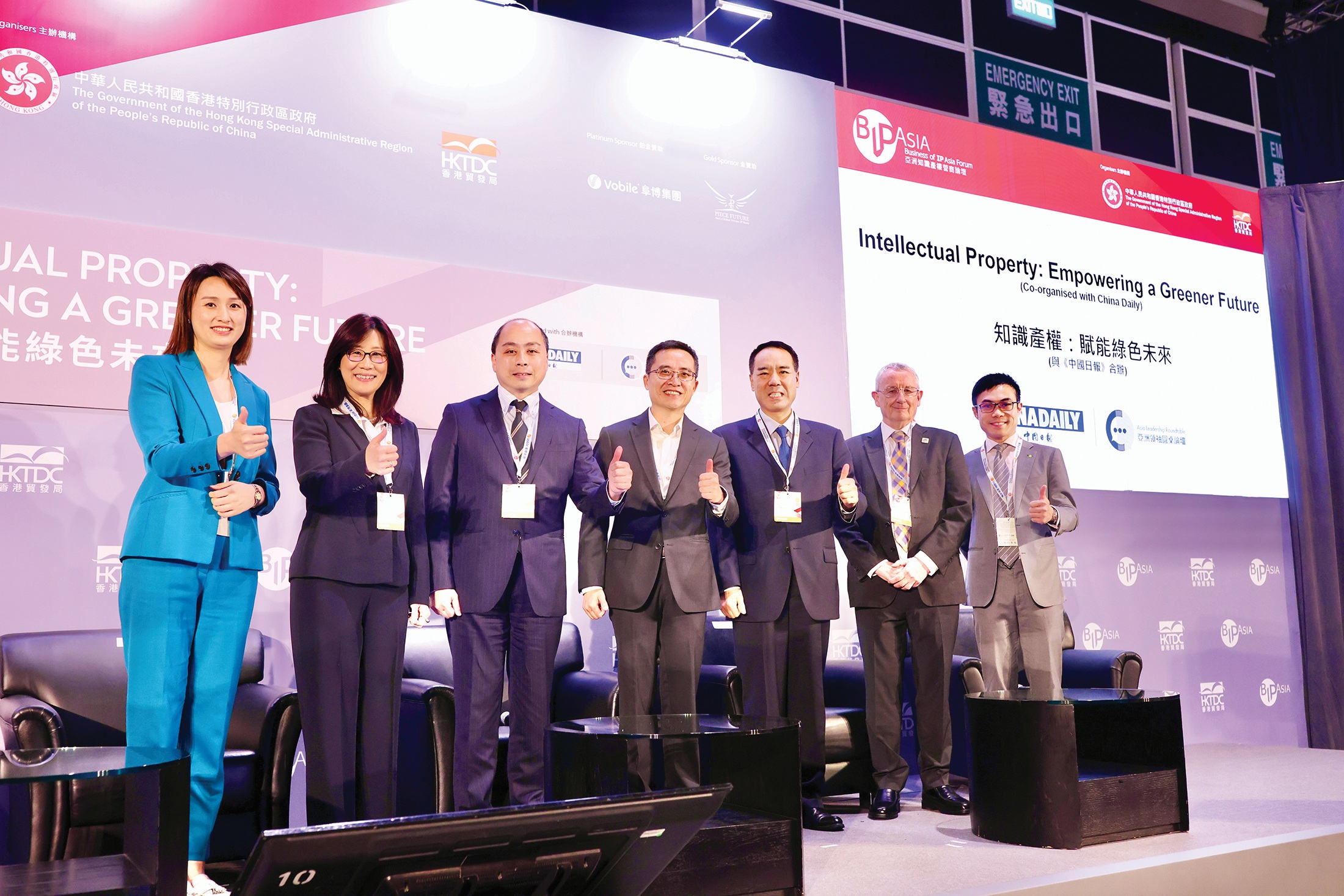
HONG KONG – A concerted effort from all stakeholders is essential for driving a sustainable transition through the use of intellectual property.
In this context, Hong Kong, which is doubling down on innovation and technology and having global connectivity, is well-positioned to facilitate cross-border and international IP collaboration.
These observations were made by experts and industry insiders during the China Daily Asia Leadership Roundtable on Friday. The roundtable, themed “Intellectual Property: Empowering a Greener Future”, is part of the 14th Business of Asia IP Forum, co-organized by the Hong Kong Special Administrative Region government and the Hong Kong Trade Development Council.
Zhou Li, deputy editor-in-chief of China Daily Group and publisher and editor-in-chief of China Daily Hong Kong, said IP protection could provide innovators and companies with the confidence to invest in research and development, assuring that their efforts are secure.
As a regional hub for IP trading, Hong Kong exemplifies how IP can drive collaboration and progress with its strong IP framework and dynamic innovation ecosystem, added Zhou, who is also chairman of the Asia Leadership Roundtable.
READ MORE: Forum: HK well positioned to contribute to IP landscape
“By protecting new ideas, IP establishes a foundation for investment, collaboration, and the equitable distribution of resources necessary for a greener, more sustainable future,” he said.
In his special address, Cai Xin, deputy director-general of the Beijing Municipal Intellectual Property Office, said, “Enhancing IP protection and promoting sustainable development is a long-term endeavor that requires collaboration from governments, businesses, research institutions, and organizations.”
Cai said that through transformation and the improvement of legal systems, Beijing has ramped up its efforts to help green-tech companies and research institutions apply for patents and enhance their respective IP capabilities. Cai expressed hopes for strengthened IP cooperation between Beijing, Hong Kong and the rest of the world.
Moderating the session, Grace Chai, deputy editor of business news at China Daily Hong Kong, said sustainability has been one of the most pressing issues on corporate agenda and government policies, which has made discussions about how IP can help address global challenges particularly valuable.
The main issue regarding IP related to green technologies in Hong Kong has been that technology transfer primarily occurred within universities, whereas in similar regions, it is mainly led by large corporations, said Alvis Kong, a partner of strategy and economic advisory at Deloitte China. While Hong Kong boasts top-tier universities, it lacks a leading conglomerate capable of driving the commercialization of technological findings.
But “Hong Kong is under the trend of transformation, (with) more companies trying to lead IP commercialization,” Kong said.
He said that while Hong Kong is not a manufacturing hub because of the city’s high labor and land costs, it has talent and a sophisticated IP system. This enables Hong Kong to capture the most valuable stages of innovation, allowing it to benefit from the prototyping phase before large-scale production.
Regarding the goal of emission reduction that Hong Kong aims to achieve by 2030, Kong saw “collaboration” as a keyword. “IP is from innovation. Innovation is never coming from one company. It’s about how to leverage the entire ecosystem and collaborate to make this work.”
Isabella Liu Fang-chun, a partner of intellectual property and technology at law firm Baker & McKenzie, said she is confident in and optimistic about the goal. She said Hong Kong enjoys unique advantages, such as its strengths in finance and professional services as well as access to talent from the Chinese mainland, which can help fuel green development.
Liu also said the increasingly streamlined patent processes around the world, saying that “key jurisdictions (globally) are providing expedited prosecution pathway for (green and low-carbon) techs.”
It used to take two to three years from filing to grant of a patent in China, but now, applicants can expect to see office action within 45 days upon filing, Liu pointed out, adding that a similar improvement is also being seen in the US.
“This is the commitment from different policymakers in making it easier for enterprises, big and small, to build up their (patent) assets and to boost innovation,” she said.
Henry Wheare, board member and Asia regional vice-chair of Global Intellectual Property Alliance, said China is the world’s top filer of patent applications. From 2016-22, over 36 percent of the world’s granted green and low-carbon technology patents were from China, followed by Japan, Europe, and the United States.
ALSO READ: Experts says HK well poised to cash in on IP trading
Also highlighting the practice of the Association of Southeast Asian Nations to streamline their patent approval process, Wheare said, “I would hope in future to see greater collaboration between creators, protectors and enablers” in light of the looming global threats.
Focusing on green energy initiatives, especially hydrogen energy and green methanol, Don Cheng Hill-kwong, chief operating officer of Hong Kong business at the Hong Kong and China Gas Co, said his company started producing hydrogen-rich town gas since 1862, or 162 years ago, and currently can supply 34 metric tons of hydrogen per day.
In this process, IP can encourage corporations like his to invest in the research and development of green technologies, which is expensive but with potential, Cheng added, and emphasized the need to have more education and promotion to make companies aware of the importance of IP.
Contact the writer at irisli@chinadailyhk.com


